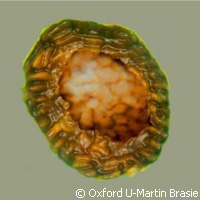Palaeobiologists uncover how sun and sex on land emerged earlier than thought
If you thought that life on land began 500 million years ago, think again. Scientists from the United Kingdom and the United States have found new evidence that it was 1 billion years ago instead. Presented in the journal Nature, the study sheds light on how life on earth changed from small, simple bacterial (prokaryotic) cells to bigger, more complex (eukaryotic) cells, effectively making photosynthesis and sexual reproduction possible. The team from the University of Sheffield and the University of Oxford in the United Kingdom, as well as Boston College in the United States, launched an investigation around Loch Torridon, a sea loch on the west coast of Scotland in the Highlands, and found the preserved remains of organisms that made their home on the bottom of ancient lake beds as long as 1 billion years ago. The researchers discovered fossils that are finely ornamented yet so big and complex that they add considerable weight to theories of when complex eukaryote cells first emerged on land. All things green, like land plants, algae and trees, evolved and colonised our land because of the evolution of these complex cells, according to the team. Co-author Leila Battison of Oxford University says: 'What is exciting about these fossils is that they record the appearance of non-marine eukaryotic cells. No fossils at all are found in non-marine rocks until around 450 million years ago, so this research extends the record of non-marine fossils by an extra 500 million years.' Two key developments took place 500 million years following the emergence of the complex cells: animals moved from the sea to land, and simple vegetation including mosses, liverworts and lichens covered the surface of land some 500 million years after the emergence of the complex cells. Joining this diverse list of creatures and plants were fish, reptiles, flowering plants, conifers, mammals and humans. 'It is generally considered that life originated in the ocean and that the important developments in the early evolution of life took place in the marine environment: the origin of prokaryotes, eukaryotes, sex and multicellularity,' explains Dr Charles Wellman, Reader in Palaeobiology, Department of Animal and Plant Sciences, University of Sheffield, and a co-author of the study. 'During this time the continents are often considered to have been essentially barren of life - or at the most with an insignificant microbial biota dominated by cyanobacteria. We have discovered evidence for complex life on land from 1-billion-year-old deposits from Scotland. This suggests that life on land at this time was more abundant and complex than anticipated.' He goes on to say that the findings could provide insight into how major events in the early history of life could have occurred on land and not completely within the marine realm. Commenting on the results, Professor Martin Brasier of the Department of Earth Sciences at the University of Oxford says: 'These new cells differ from their bacterial ancestors in that they have specialised structures including a nucleus, as well as mitochondria and chloroplasts - which are vital for photosynthesis. They also undergo sexual reproduction, leading to much more rapid rates of evolutionary turnover.' The sort of conditions found in the ancient lakes around Loch Torridon could even have favoured a critical step in this transformation, involving the incorporation of symbiotic bacteria into the cell to form chloroplasts, according to him. 'None of this would have been possible without advances long ago made by these little microbes, now entombed within phosphate from the Torridon lakes,' Professor Brasier remarks. 'It was arguably these organisms that helped to turn our landscape from a harsh and rocky desert into a green and pleasant place.'For more information, please visit: University of Sheffield: http://www.sheffield.ac.uk/ University of Oxford: http://www.ox.ac.uk/ Nature: http://www.nature.com/
Countries
United Kingdom, United States

